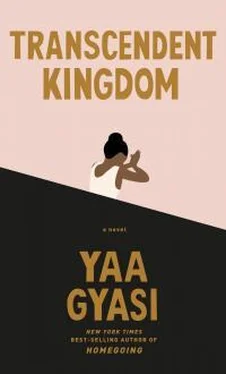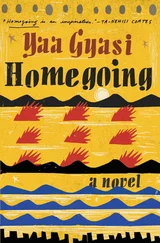Outside the airport, Aunt Joyce flagged down a man selling koko in pouches. She bought two for me and one for herself.
“Eat,” she said, ready to commence the fattening-up process right there and then. I sucked the porridge from the plastic, urging myself not to cry, while my aunt, the stranger, watched me. She didn’t look away, nor did she stop talking, until I had finished every drop in both bags.
“Your mother always thought she was better than us, but you see,” she said, raising her eyebrows at me. What was I supposed to see? My too-skinny body? My presence in Ghana? Or maybe I was to see my mother, whom I could not see clearly that summer. No matter how hard I tried, I couldn’t picture her face. My aunt Joyce and I sat outside the airport for an hour while she told me story after story after story about my mother, but all I could picture was the sloping curve of a woman’s back.
42
“No weapon formed against me shall prosper. I said NO WEAPON. FORMED AGAINST ME. SHALL PROSPER.”
The pastor of the largest Pentecostal church in Kumasi was stomping back and forth onstage, using his feet as exclamation marks. As he shouted, a chorus of Amens and Hallelujahs filled the sanctuary. A woman fell out in the Spirit and another rushed to fan her, shouting, “Thank you, Jesus,” as her white handkerchief fluttered birdlike over the woman’s body. I sat in the first pew with Aunt Joyce, who periodically nodded her head, pointed to the pastor, and said, “Enh-hnh. That’s right,” as though she and he were in private conversation with each other, not in the swelteringly hot sanctuary of a charismatic evangelical church in Kumasi with hundreds of other congregants all around them.
We were engaged in spiritual warfare. Or, at least, everyone else was. I was swooning in the Sunday sun, watching the sweat bead on my arms. Every time the pastor stomped, his own sweat would fling from his hair and baptize those of us who were sitting in the front row. I was disgusted every time a droplet landed on me, but then I would remember my wish of only a few years before—to be baptized in water—and I would have to stifle a laugh.
My laughter didn’t fit with the pastor’s message. “There are demons all around us,” he said. “There are demons who have tried to take our children. We cast them out in Jesus’s name.”
To my left, the woman beside me put her hands to her chest, her stomach, her legs, before flinging them back into the air. Her face, almost angry in its intensity, told me everything I needed to know: she had demons in need of casting off.
This was not the First Assemblies of God in Huntsville, Alabama. This wasn’t evangelicalism as I knew it. The noise of this worship service alone made the worship of my childhood church sound like the muffled, timid singing of a kindergarten choir. I had never heard Pastor John talk about demons and witches as though they were living, breathing beings, but this pastor spoke as if he could see them seated among us. My mother had grown up in a church like this, but she had not come back to Ghana to engage in spiritual warfare. She’d sent me as a kind of emissary. Sitting there, melting into a puddle at my own feet, I pictured my mother as I’d left her, and I knew that if her own faith, a living, breathing thing, could not save her, then my small portion would do nothing.
Aunt Joyce and I took a taxi from the service back to her house. I rolled the windows down and tried to let my body air out.
“That was a powerful service,” Aunt Joyce said. “Powerful.”
I looked out of the window and thought about how much Nana would have liked to be here. To see this country of ours and to help me to navigate all of my own complicated feelings about it. “Very powerful,” I told my aunt.
She smiled and took my hand. “Don’t worry. Your mother will be feeling well again very soon.”
—
That summer in Ghana, I learned to pound fufu. I learned to haggle at the market, to get used to cold-water bucket baths, to shake coconuts down from their trees. I developed an Encyclopedia of Knowledge I Didn’t Want, waiting for the day when my mother would call me back to America and I could forget everything I had learned. One week became two became three. As time dragged on, I thought that maybe I was going the way of the Chin Chin Man, lost to this country, lost to my family.
“Where’s my father?” I asked Aunt Joyce one day.
I was already a month into my stay, and I hadn’t said a word about him. If Aunt Joyce had been waiting for this moment, she didn’t show it. “He lives in town. I’ve seen him a few times in Kejetia, but he doesn’t come to my stall very often anymore. I don’t think he even goes to church.” She said this last part with her nose scrunched, as though she had smelled something rotten. But the Chin Chin Man’s derelict church attendance smelled of roses when compared to the stench of all of his other misdeeds.
“Can I see him?” I asked, and, minutes later, we were climbing into a taxi.
—
The Chin Chin Man lived in Tanoso, off of Sunyani Road, not far from the Yaa Asantewaa Secondary School. His house was of a modest size, brick red in color, with a tall, imposing steel fence. He must have had at least five dogs, and all of them rushed to the fence in barking menace as Aunt Joyce and I approached. I stood there peering through the cracks, avoiding the gnashing jaws of the dogs, while Aunt Joyce pushed the button at the gate. She pushed twice, three times, and we could hear the high-pitched squeak it made all the way out where we stood.
“Where is he?” my aunt said, pushing again.
Finally, a woman came out to silence the dogs and open the gate. She and Aunt Joyce spent the next minute speaking Twi, too fast for me to understand.
“Gifty, this is your father’s wife,” Aunt Joyce said.
The woman turned to me and smiled. “Come in, come in,” she said, and we all wandered inside the house.
The Chin Chin Man was waiting for us in the living room. He stood as soon as we entered, and stepped toward me, arms open. “Eh, Gifty, look how big you are,” he said.
And I couldn’t hug him. I couldn’t stand to hear his voice, which for most of my life I had only ever heard in disembodied form, through electric currents. Now here it was, coming out of a mouth affixed on a head that rested atop that long, lean, muscular body. Nana’s body.
“Did you know I was here?” I asked.
He lowered his arms and his eyes. He cleared his throat to speak, but I wasn’t finished.
“She tried to kill herself, did you know that? She almost died and then she made me come here and you knew I was here this whole time, didn’t you?”
His wife stepped in, offering drinks and food. Though I had been taught it was rude to refuse Ghanaian hospitality, I did so anyway, and for an hour, I sat in complete silence, scowling while the Chin Chin Man talked.
In person, he wouldn’t shut up. Nervous, loud, bumbling stories about his work, his friends, his life without us. He never said a word about my mother or Nana. He never said sorry, and I was old enough then to know that he never would.
On the car ride home, I asked my aunt if my father had ever asked her about me or my mother on his visits to her stall.
“Oh, Gifty,” my aunt said.
“What?”
“Ofɛre.”
“What does that mean?” I asked. I had already reached the limits of my Twi understanding, but Aunt Joyce either could not or refused to speak English for longer than a couple of sentences a day. Whenever I asked her to repeat something in English, she would tell me that I wasn’t trying hard enough to understand or she would point out, yet again, all the ways that she thought my mother had done a poor job of parenting me.
Читать дальше












